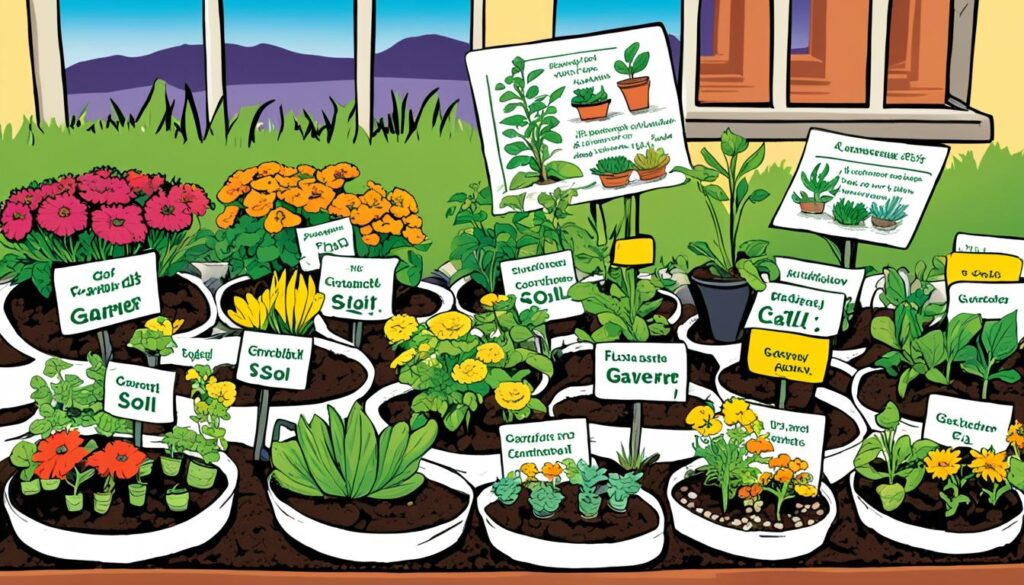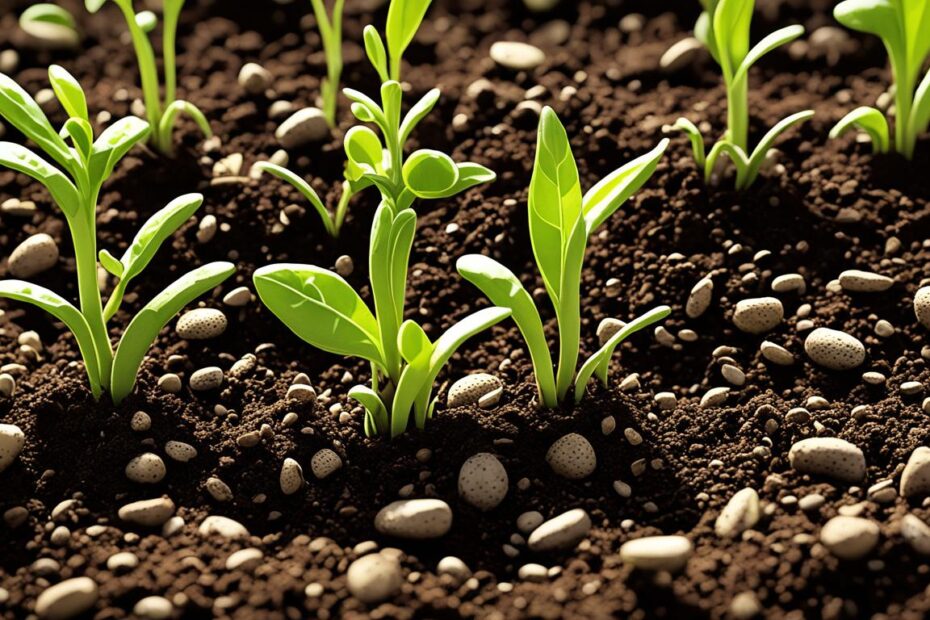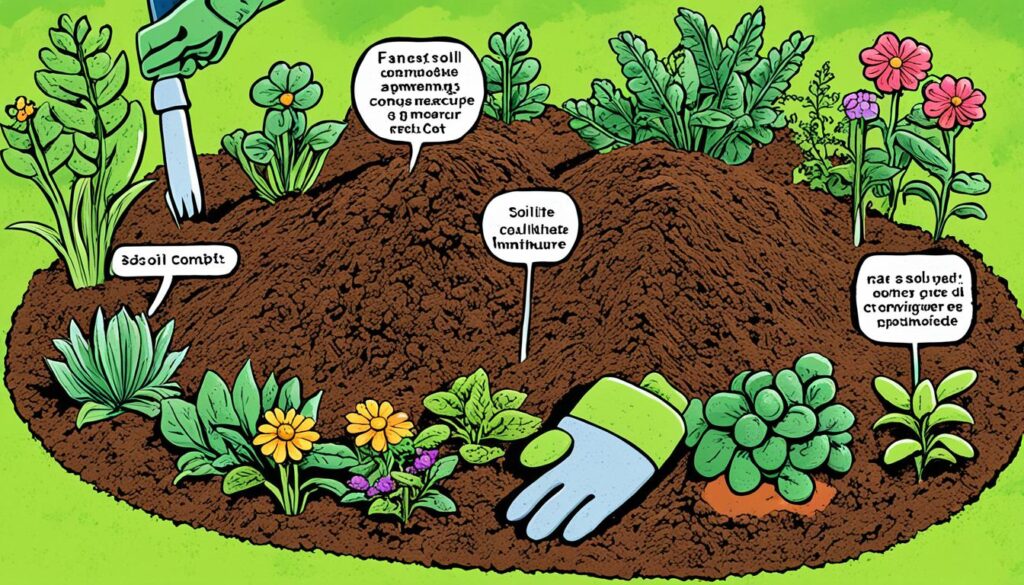Are you struggling to find the right soil for your garden? The success of your plants depends on the quality of the dirt they grow in. But how do you know which is the best dirt for your garden? Is it a matter of opinion or science? Let’s dig deeper and uncover the secrets to nurturing healthy, thriving plants.
Key Takeaways:
- Soil is a crucial factor for successful gardening and plant growth.
- The best dirt for your garden depends on factors like soil type, pH level, drainage, and nutrient content.
- Conducting a soil test can provide valuable insights and guide soil improvement efforts.
- Adding organic matter, compost, and appropriate soil amendments can enhance soil quality.
- Choosing the right soil mix for different planting methods is essential for optimal plant growth.
Understanding Soil Types for Vegetable Gardens
When it comes to vegetable gardens, the type of soil you choose can significantly impact the success of your plants. Different soil types have distinct characteristics that influence factors like nutrient availability, drainage, and water retention. By understanding the soil types available, you can make informed decisions on how to enhance your garden’s soil quality and create optimal conditions for plant growth.
There are three primary soil types commonly found in vegetable gardens:
- Clay soil: This soil type is known for its high nutrient content, making it ideal for supporting plant growth. However, clay soil can become compacted and have drainage issues, potentially leading to saturated roots and plant stress.
- Sandy soil: Sandy soil offers excellent drainage and is effortless to work with during gardening tasks like planting and transplanting. However, sandy soil may lack essential nutrients and struggle to retain water, requiring additional watering and fertilization to support healthy plant growth.
- Loam soil: Often considered the ideal soil type for vegetable gardens, loam soil offers a perfect balance of clay, silt, and sand. It provides good drainage, retains moisture and nutrients, and allows roots to access sufficient air. Loam soil is highly fertile and supports plants in developing strong root systems and thriving overall.
Understanding the soil type in your garden is crucial because it affects the choice of soil amendments and the necessary steps for improving soil quality. While clay soil may require amendments to improve drainage, sandy soil may benefit from organic matter to enhance its nutrient-holding capacity. Loam soil, while already favorable, can still benefit from regular additions of compost or other organic matter to maintain its fertility and structure.
“The key to a successful vegetable garden lies in understanding your soil type and making the necessary amendments to create an optimal growing environment.”
Choosing the Right Soil Amendments for Your Garden
Transforming your garden soil into a nutrient-rich and well-draining environment is essential for the success of your plants. By choosing the right soil amendments, you can improve soil structure, replenish essential nutrients, and enhance water retention. Here are some organic amendments and fertilizers that can make a significant difference in your garden:
- Compost: Compost is a fantastic organic amendment that enriches the soil with beneficial microorganisms and adds essential nutrients. It improves soil structure, enhances water absorption, and promotes healthy root development.
- Manure: Organic animal manure, such as cow or chicken manure, is another excellent option for soil enrichment. It adds nutrients, improves soil texture, and enhances microbial activity.
- Organic garden fertilizers: Utilizing organic fertilizers provides a sustainable and eco-friendly approach to replenishing nutrients in the soil. Look for fertilizers with a balanced NPK ratio to meet the specific needs of your plants.
- Coir: Coir, derived from coconut husks, is a soil amendment that improves water retention and aeration. It helps prevent soil compaction and provides a favorable environment for root growth.
- Peat moss: Peat moss is a popular soil amendment that enhances water retention and improves soil structure. It also aids in maintaining the optimum pH level for plant growth.
- Arbor fines: Arbor fines, made from ground tree trimmings, enrich the soil with organic matter. They improve water retention, promote microbial activity, and gradually release nutrients to the plants.
Choosing the Right Soil Amendments Based on Specific Needs
The choice of soil amendments depends on your garden’s unique characteristics and the specific needs of your plants. Taking into account your soil type, pH level, and drainage, you can tailor your soil amendment approach to maximize gardening success.
For instance, if you have clay soil that tends to be heavy and poorly draining, incorporating compost, coir, or arbor fines can enhance water absorption and improve aeration. These amendments will help break up compacted clay particles and create a more favorable environment for plant roots.
If you have sandy soil, which drains quickly and lacks nutrient-retaining capacity, adding compost, manure, or peat moss can increase water and nutrient retention. These amendments improve the soil’s ability to hold moisture and ensure that plants receive adequate nourishment.
Remember to conduct a soil test to determine any deficiencies or imbalances before selecting the appropriate amendments. This will ensure that you provide your plants with the necessary nutrients and create a healthy growing environment.
Summary Table: Soil Amendments for Garden
| Soil Amendment | Benefits |
|---|---|
| Compost | Improves soil structure Enriches with nutrients Enhances water absorption |
| Manure | Enriches with nutrients Improves soil texture Enhances microbial activity |
| Organic garden fertilizers | Replenishes essential nutrients Supports sustainable gardening practices |
| Coir | Improves water retention Enhances aeration Prevents soil compaction |
| Peat moss | Enhances water retention Improves soil structure Helps maintain pH level |
| Arbor fines | Enriches with organic matter Improves water retention Promotes microbial activity |
Creating Custom Soil Mixes for Different Planting Methods
The type of planting method you choose can have a significant impact on the soil requirements for your garden. Whether you opt for in-ground gardening, raised beds, or container gardening, customizing your soil mix is essential for optimal plant growth and success.
In-Ground Gardening
For in-ground gardening, a well-balanced soil mix is crucial to promote healthy root development and nutrient absorption. This requires combining various components to improve soil structure, drainage, and nutrient content.
Start with a base of sandy soil, which provides good drainage and prevents waterlogged conditions. Then, incorporate compost into the soil mix to enhance its nutrient content and promote overall soil health. Compost serves as a natural fertilizer, supplying essential organic matter and beneficial microorganisms.
Add organic fertilizer to enrich the soil further with necessary nutrients for plant growth. Organic fertilizers are slow-release and provide a steady source of nutrients over time. This helps plants establish strong root systems and ensures they receive the necessary nourishment throughout their lifecycle.
Remember to periodically test your soil to check for nutrient deficiencies or imbalances. A soil test can provide valuable insights into your soil’s nutrient content and help you adjust your soil mix accordingly.
Raised Beds and Containers
Raised beds and containers offer distinct advantages for gardening, such as better control over soil quality and drainage. To create a custom soil mix for these planting methods, it’s essential to prioritize factors like water retention and nutrient availability.
Incorporate coarse sand or perlite into the soil mix for raised beds or containers. These additives enhance drainage, preventing water from accumulating and causing root rot. The improved drainage helps plants thrive and minimizes the risk of waterlogged soil.
Additionally, increasing the amount of compost and organic matter in the soil mix for raised beds or containers is crucial. This ensures a steady supply of nutrients for plant growth and helps retain moisture around the roots, preventing soil dehydration.
By customizing your soil mix to accommodate different planting methods, you set a solid foundation for your plants to flourish. Consistent attention to soil quality, nutrient content, and drainage will result in robust and healthy plants, yielding bountiful harvests throughout the gardening season.
If you want to see a visual representation of the different soil mixes for different planting methods, take a look at the table below:
| Planting Method | Soil Mix Components |
|---|---|
| In-Ground Gardening | Sandy soil, compost, organic fertilizer |
| Raised Beds and Containers | Sandy soil, compost, organic matter, coarse sand or perlite |

Creating custom soil mixes tailored to your specific planting method is the key to achieving a thriving garden. Whether you choose in-ground gardening, raised beds, or containers, understanding your soil’s needs and providing the appropriate components will lay the groundwork for a successful growing season.
The Benefits of Soil Testing
Conducting a soil test is an essential step in optimizing your garden’s growth and ensuring healthy plants. It provides valuable insights into the quality of your garden soil, offering information about pH levels, nutrient content, and potential deficiencies. By understanding the specific needs of your soil, you can make informed decisions about the appropriate soil amendments and fertilizers to use, ultimately benefiting your plants and increasing yield.
Soil testing allows you to identify nutrient deficiencies or toxicities that may hinder plant development, enabling you to take proactive measures to address them. By optimizing the nutrient levels in your soil, you create an ideal environment for plant growth and maximize the potential of your garden.
Why Soil Testing Matters
Soil testing provides several key benefits that directly impact the success of your garden:
- Accurate assessment: A soil test offers accurate and reliable information about your soil’s current nutrient levels, pH balance, and overall health. This data allows you to tailor your soil management strategies to address specific deficiencies or imbalances.
- Optimal nutrient balance: By identifying nutrient deficiencies or excesses, you can create a customized soil amendment plan to achieve the optimal balance of nutrients necessary for plant growth. This targeted approach promotes healthier plants and maximizes yield.
- Cost-effective gardening: Properly addressing soil deficiencies based on test results can save you money in the long run. By using the right amendments and fertilizers, you prevent wasteful spending on unnecessary products and ensure that you are effectively supplying your plants with the nutrients they need.
- Environmental impact: Soil testing helps minimize environmental impact by reducing the use of unnecessary fertilizers, preventing nutrient runoff, and promoting sustainable gardening practices. By cultivating a healthy soil ecosystem, you contribute to the overall well-being of your garden and the surrounding environment.
- Optimized plant health: When you understand the specific needs of your soil, you can provide your plants with the ideal growing conditions. This results in stronger, more disease-resistant plants that are better equipped to withstand environmental stressors.
How to Conduct a Soil Test
Conducting a soil test is a straightforward process that can be done with a soil testing kit or by sending a sample to a local agricultural extension office or professional laboratory for analysis. The steps typically involve:
- Choosing sampling locations that represent the various areas of your garden.
- Collecting soil samples from each designated location, ensuring to remove any debris or rocks.
- Labeling each sample with its corresponding location.
- Sending the samples for analysis.
- Receiving the test results, which will provide recommendations for soil amendments based on the specific nutrient deficiencies or imbalances identified.
By following these steps and incorporating the recommended amendments, you can effectively optimize your garden soil and create a fertile foundation for plant growth and success.
CLICK HERE TO CHECK OUR RECOMMENDED PRODUCTSConclusion
Choosing the best dirt for your garden is a crucial step in nurturing healthy plants and achieving bountiful harvests. Soil quality plays a significant role in plant growth, and understanding the components of soil, nutrients plants need, and specific factors like soil type, pH, drainage, and nutrient content can guide your soil improvement efforts.
By incorporating organic matter, compost, and appropriate soil amendments, you can create a custom soil mix tailored to your planting method and plant requirements. Organic garden fertilizers, compost, organic matter, and mulch are effective ways to improve soil quality. These amendments enrich the soil with essential nutrients, improve soil structure, and provide a fertile environment for plant growth.
Conducting a soil test is highly recommended as it helps optimize soil health and ensures that your garden is getting the necessary nutrients. A soil test reveals valuable information about the pH level, nutrient content, and potential deficiencies or imbalances in the soil. With this knowledge, you can make informed decisions about the appropriate soil amendments and fertilizers to use, maximizing plant growth and preventing nutrient deficiencies or toxicities.
Cultivating growth in your garden starts with providing the best soil foundation for your plants. By paying attention to soil quality and implementing the right practices, you can create an environment where your plants thrive and flourish. So get your hands dirty, nurture your soil, and witness the beauty and abundance that your garden can offer.
FAQ
What are the components of soil?
Soil consists of minerals, organic matter, living organisms, water, and air.
What are the primary macronutrients plants need?
The primary macronutrients plants need are nitrogen, phosphorus, and potassium (NPK).
What factors should I consider when determining the best soil for a vegetable garden?
Factors to consider include soil type, pH level, drainage, and nutrient content.
How can I improve soil quality in my garden?
Adding organic matter, compost, organic garden fertilizers, and mulch can improve soil quality.
What are the different soil types for vegetable gardens?
The different soil types for vegetable gardens include clay, sandy, and loam soil.
Which soil amendments are best for my garden?
Compost, manure, coir, peat moss, and arbor fines are all effective soil amendments.
What soil mix should I use for raised beds or containers?
For raised beds or containers, a soil mix with coarse sand, perlite, compost, and organic matter is recommended.
Why is soil testing important?
Soil testing provides valuable information about pH levels, nutrient content, and potential deficiencies or imbalances in the soil.

